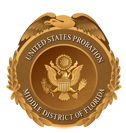Information for Felony Offenders
Civil Rights
Florida law deprives convicted felons of certain Civil Rights including the right to vote, serve on a jury, hold public office, and restricts the issuance and renewal of some professional licenses such as real estate and insurance. Upon final expiration of an offender's supervision, providing they have no outstanding criminal charges or outstanding monetary obligations as a result of their criminal conviction, offenders may apply for Restoration of Civil Rights lost in the State of Florida with exception of the right to own and possess firearms.
Offenders may be issued a restoration certificate by the Office of Executive Clemency as soon as their application has been reviewed by the Florida Parole Commission and it has been determined that they meet the qualifications for restoration. Specific authority to own or possess a firearm may be reinstated by the State of Florida and the United States Treasury as indicated below.
Firearms
Federal law forbids persons with felony convictions or discharges from the Armed Forces under dishonorable conditions to possess firearms, ammunition, or explosives. The penalty is ten years imprisonment and/or a $250,000 fine. Florida law makes possession of a firearm by a felon a second degree felony punishable by a minimum term of three years, and up to 15 years, imprisonment. Violation of these laws is a violation of probation, parole, and supervised release, and could result in an additional term of imprisonment for that violation.
Additionally, offenders should be aware that Title 18, United States Code, Section 3565(b) provides that probation and supervised must be revoked if a person on probation is in possession of a firearm. This includes misdemeanants, thus anyone under federal probation supervision (felony or misdemeanor) is prohibited from possessing firearms.
Offenders must request an application from the State of Florida, Office of Executive Clemency, for specific authority to own and possess firearms 8 years after the date of their release from supervision. Current Federal law provides that when an offender has obtained a restoration of civil rights and specific authority from the State, they must then make a separate application to Federal authorities to be relieved of disabilities suffered under the Federal Firearm Act.
Fidelity Bonding
Commercial bonding companies will not generally provide for a fidelity bond for a convicted felon, but offenders may apply for the ex-offender bonding program administered by the State of Florida, One Stop Career Service, Workforce Innovation program. Further information may be found by inquiring at your local One Stop Career Service center.
Travel
Offenders may not leave the Middle District of Florida without permission of the Probation Officer. Any travel outside the district requires advanced written permission. Unless otherwise instructed by their Probation Officer, offenders may travel within the Middle District of Florida without special permission. All other requests for travel within the United States should be made at least two weeks in advance; requests for outside the United States must be made at least one month in advance and will generally be for hardship reasons only. No pleasure travel will be allowed during the first 60 days of supervision. Travel requests may be denied if any monetary obligations are delinquent.
Annual Documents
Offenders will be required to submit a signed copy of their income tax return each year immediately after filing, along with supporting documentation, as well as copies of their driver's license, proof of insurance, and vehicle registration(s). Florida law requires individuals to change the address on their driver's license and automobile registration(s) within ten days of every address change.
Drugs
Any use of illicit drugs while under supervision in this district will not be tolerated and may result in violation proceedings. The Anti-Drug Abuse Act of 1988, and the Violent Crime Control and Law Enforcement Act of 1994, requires revocation if an offender is found by the Court or the Parole Commission to be in possession of a controlled substance.
United States Probation Officers have authority to obtain urine specimens from any person under supervision. Failure to submit a urine specimen upon request will result in notification to the Court or the Parole Commission and possible violation proceedings.
